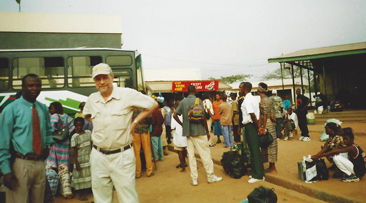
Accra Lorry Station (2001)
Franz Kröger
Going Home to Buluk
(based on diary extracts, January 2001)
 |
|
Accra Lorry Station (2001) |
On a Friday morning, a bus fully loaded with people and luggage is waiting at the Accra bus station. This is a special bus. Once a week it travels from Accra directly to Bulsaland without picking up any other travelers along the way.
Children are crying, women are screaming and some men are arguing over a free seat.
Everybody speaks Buli here. Then another kind of unrest boils over. The luggage store under the
bus is full, and some newcomers remove boxes and baskets in order to store their own luggage.
Of course this causes angry and loud disputes. Finally, the bus starts moving and peace is
restored. Outside of Accra, the first tape recorder is switched on: Southern Ghanaian highlife
music, pop songs and, again and again, Bulsa songs. At first the bus riders are hesitant, but they
grow more determined, and eventually everyone joins in the singing. All of the passengers are
obsessed with the idea of seeing their Bulsa home soon.
The bus is approaching Walewale in Northern Ghana. The early excitement has gone, and the
community songs have fallen silent. Some passengers have fallen asleep.
Only two women behind me are singing Christian hymns without interruption. I do not mind.
They help me in my attempts to fall into a half-sleep in spite of my uncomfortable seat.
We are just reaching the outskirts of Walewale when a restlessness suddenly pervades the bus.
A man gives some orders in a loud voice, some women huddle forward over the seats. Just
behind me a baby has been born to one of the two singers. An older woman experienced in
midwifery takes the baby by its feet and tries to stimulate its blood circulation by repeatedly
beating its buttocks with her flat hand. It is in vain, although some other women try.
The bus driver immediately sets his course for the hospital of Walewale. There, the mother
climbs out with her still-motionless baby. Those left behind are nervously awaiting the first
message from the emergency room. Finally, a young man comes and tells them that the mother
is in good health, but the baby is dead. The young man passes his a cap around the travelers on
the bus to collect money for the mother remaining in the hospital. Then he says a prayer in front
of all of the passengers, and the bus begins moving again.
In the night at about 2 a.m., I arrive at Wiaga.